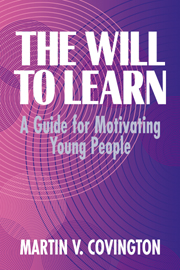Book contents
- Frontmatter
- Contents
- 1 The Future and Its Discontents
- 2 Motives as Emotions
- 3 Motives as Thoughts
- 4 Self-Worth and the Fear of Failure
- 5 The Competitive Learning Game
- 6 Motivational Equity and the Will to Learn
- 7 Strategic Thinking and the Will to Learn
- 8 An Immodest Proposal
- 9 Obstacles to Change: The Myths of Competition
- Epilogue
- Appendixes
- References
- Author Index
- Subject Index
2 - Motives as Emotions
Published online by Cambridge University Press: 31 January 2011
- Frontmatter
- Contents
- 1 The Future and Its Discontents
- 2 Motives as Emotions
- 3 Motives as Thoughts
- 4 Self-Worth and the Fear of Failure
- 5 The Competitive Learning Game
- 6 Motivational Equity and the Will to Learn
- 7 Strategic Thinking and the Will to Learn
- 8 An Immodest Proposal
- 9 Obstacles to Change: The Myths of Competition
- Epilogue
- Appendixes
- References
- Author Index
- Subject Index
Summary
Emotions are feelings with thoughts incidentally attached.
David HumeTHE BEGINNING
There are many individuals and events in this century that can lay claim to the beginnings of the scientific investigation of achievement motivation. We begin with a little known drama of great importance.
the players: Professor Kurt Lewin and his laboratory assistant, Ferdinand Hoppe.
the time: 1931–1932.
the place: A small laboratory at the University of Berlin.
Professor Lewin's laboratory was crowded with the research paraphernalia of his time, including an odd conveyor-belt device. This contraption allowed a series of pegs to move on circular rollers at a uniform rate of speed, much like a row of ducks in a shooting gallery. This unlikely apparatus would provide the key to the question of how, psychologically, humans define success and failure. There are few consistent yardsticks when it comes to judging whether a particular achievement is successful – certainly not in the same sense that we can objectively measure height, weight, or temperature. Success and failure mean different things to different people. The same accomplishment can elicit pride in one person and self-rebuke in another, giving rise to the truism that “one person's success is another person's failure.” For all the subjectivity involved, however, these judgments do proceed in lawful ways as Professor Lewin and Ferdinand Hoppe were to discover.
- Type
- Chapter
- Information
- The Will to LearnA Guide for Motivating Young People, pp. 27 - 55Publisher: Cambridge University PressPrint publication year: 1997



